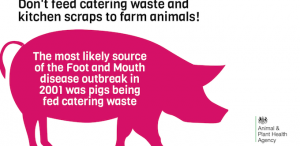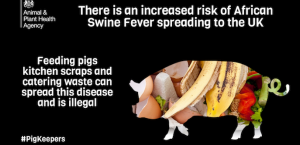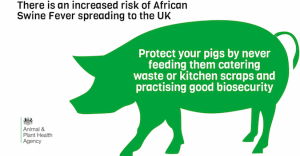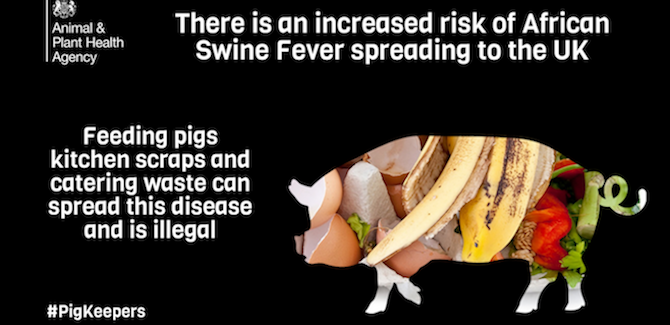The Government has joined forces with the NPA and other industry bodies to remind pig keepers not to feed kitchen scraps to their animals to prevent outbreaks of diseases like African Swine Fever.
 The campaign, as flagged up on this site last week as the ASF risk was featured on Countryfile, has now been formally launched with a range of graphics carrying some clear messages designed primarily to be circulated on social media. It reflects increasing concerns over the continuing spread of ASF in Eastern and Central Europe.
The campaign, as flagged up on this site last week as the ASF risk was featured on Countryfile, has now been formally launched with a range of graphics carrying some clear messages designed primarily to be circulated on social media. It reflects increasing concerns over the continuing spread of ASF in Eastern and Central Europe.
Keepers are being reminded that it is illegal to feed catering waste of any description or domestic food waste to farm animals in the UK, including pigs kept as pets. This includes food from vegetarian kitchens, as there is still a risk of cross contamination in products of animal origin such as milk.
Some of the outbreaks of African swine fever in Europe have been attributed to wild boar or domestic pigs consuming contaminated pork or pork products. The 2000 Classical Swine Fever outbreak was thought to have been caused by an outdoor pig eating a discarded ham sandwich, while the 2001 foot-and-mouth was blamed on pigs being fed illegal waste food.
 Strict hygiene measures are essential in preventing disease – people should not take meat or meat products into areas where pigs are kept and should only eat food in designated areas such as staff rooms or the farm kitchen. Pig keepers, farm staff and anyone in contact with pigs should wash their hands before and after eating or preparing food.
Strict hygiene measures are essential in preventing disease – people should not take meat or meat products into areas where pigs are kept and should only eat food in designated areas such as staff rooms or the farm kitchen. Pig keepers, farm staff and anyone in contact with pigs should wash their hands before and after eating or preparing food.
Potential consequences
UK Chief Veterinary Officer Nigel Gibbens said: “The introduction of African swine fever would have an enormous impact on our pig industry. No matter how many pigs you keep, you need to be aware of the potential consequences of feeding waste food to your animals. Not only is it illegal, but you run the risk of spreading disease which could be fatal to your livestock.
 “You can purchase a range of pig foods from your local agricultural merchant that can be safely fed to your pigs and which is the most reliable way of giving them a balanced diet. Good biosecurity is also essential for minimising disease risk, such as providing dedicated clothing and boots for workers and preventing vehicles which may be contaminated from entering pig premises.”
“You can purchase a range of pig foods from your local agricultural merchant that can be safely fed to your pigs and which is the most reliable way of giving them a balanced diet. Good biosecurity is also essential for minimising disease risk, such as providing dedicated clothing and boots for workers and preventing vehicles which may be contaminated from entering pig premises.”
NPA chief executive Zoe Davies, said: “The health of our pigs is fundamentally important to our sector. A notifiable disease outbreak would not only needlessly result in the loss of many pigs and annihilate our burgeoning export market, but would significantly impact on countless families, their staff, local businesses and tourism for months. Feeding illegal food waste, however harmless it might seem at the time, is just not worth the risk.”
ASF threat
The risk of ASF entering the UK was raised from ‘very low’ to ‘low’ (rare but could occur) over the summer, following an increase in cases in Poland and a new hot spot of wild boar cases in the Czech Republic. The latter were of particular concern due to the long distance from previous outbreaks, suggesting some form of human spread, such as via infected food or illegal animal movements.
In mid-November, the virus was found in wild boar at two different sites around 140 km from Poland’s eastern border, taking infection closer to the more pig dense area of western Poland.
Over the past month, new outbreaks of ASF have also been detected in the EU in the Czech Republic and Latvia and in Russia, Ukraine, Moldova. It is also present in Estonia, Lithuania and Sardinia.
There has never been a case of African swine fever in the UK and it does not affect humans, but it is potentially fatal to pigs. If the disease were to reach the UK it could have a devastating effect on our export market and would also mean the humane culling of pigs on infected premises to prevent further spread.
The statement was issued jointly by the Animal and Plant Health Agency, Defra, Welsh Government, Scottish Government, The Department of Agriculture, Environment and Rural Affairs Northern Ireland, the NPA, the British Pig Association, the Pig Veterinary Society, the British Veterinary Association and AHDB Pork.
More information
- EU-wide animal by-product legislation states that feeding farmed animals with catering waste or feed material containing, or derived from, catering waste is illegal. Doing so can result in prosecution.
- Fruit and vegetable material that originated outside the kitchen, which has never entered the kitchen and which has not come into contact with material of animal origin, such as vegetables grown in domestic gardens, can be fed.
- Some commercial food waste can also be fed if it has undergone the correct animal by-products processing and meets the requirements of the Feed Hygiene Regulation. The safest option if you are in doubt is not to feed any food waste to your animals.
- More information about African swine fever and how to spot it can be found at https://www.gov.uk/guidance/african-swine-fever and https://pork.ahdb.org.uk/health-welfare/health/emerging-diseases/african-swine-fever/
- If you suspect African swine fever you should notify the Animal and Plant Health Agency immediately.




